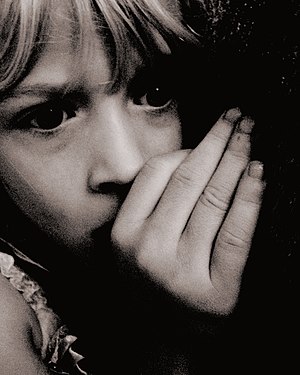 Image via Wikipedia
Image via WikipediaCan you imagine a child you have never met before, coming in to your home, opening your fridge and just taking something to eat without even a 'Hi, how you doing?'!! Or what about talking to a child about bed time and having them ask you, 'Who is going to smack us when we are bad?' We even had a child pretend they were a dog for hours on end after a particularly stressful event that happened for her. No words, just 'woof' and 'grrruff!' She even curled up with our dogs to have a nap and would only respond if we spoke to her like she was an actual dog. These are just some of the 'simple' behaviours we have come across. I will mention more in future posts.
Obviously those things are mild, for us - not the kids. But I have heard so many stories of kids coming into care, throwing knives at their carers, screaming abuse, swearing and trashing their homes. What do the carers do? Generally they take it in their stride. They call the 'on call' help number for their agency, DOCS or the police, but once the child has settled down again, they keep working with them until they either return home or they are moved to another placement.
Some of the most horrifying stories I have heard about kids behaviour, you just wouldn't believe and that's really not what this post is about. It's about the 'why' of this behaviour.
Even if the kids don't realise it themselves, they are for the most part just plain scared.
 Image by sicamp via Flickr
Image by sicamp via Flickr- Scared of a new placement with people they don't know.
- Scared that they may never see their parents again.
- Scared they will see their parents again.
- Scared they may actually like these new people they are living with but will have to move on.
- Scared the new people won't like them.
- Scared they will! Scared of rejection, humiliation, failure, success, happiness, love, the unkown.
And scared equals fear which can turn to anger. And what do kids or people in general do when they are angry and unable to express themselves? They lash out or withdraw.
 Image via Wikipedia
Image via WikipediaChildren as young as 3 can show violent behaviours towards carers, swearing, hitting, smashing things and no normal behaviour strategies that you may use with your own kids will work. You can't smack them or even threaten to smack them, you can put them in their room and shut the door, you can't even really let them out into the back yard to cool off for fear they may run away!
What do you do? You become eternally patient and understanding, take as much training as is offered and try everything you are taught to keep these kids safe and help them feel like they are wanted and loved in your home.
If the child is as young as 3 or 4 you may even succeed in helping that child have a successful future. But what if the child is 8 or 11 or 15? It's much, much harder.
In this article - Call for early care intervention, dated -27 June 2010. The UK is looking at what the costs are not just to the state but the emotional costs on the child of delaying taking them into care:
Taking vulnerable children into care earlier could save on emotional and financial costs, a study suggests.
Delays in removing such children from their families are linked with poor mental health and behaviour, say researchers from the Demos think tank.The report, funded by Barnardo's, says the care system should be de-stigmatised and seen positively.
It says the state can pay nearly £33,000 more per child per year if they have received poor care.
I know that the departmental stand here in Australia is 'unification' all the way. But at what cost to the child? When are enough chances enough?
Please have a read of the full article above when you have a chance.










No comments:
Post a Comment